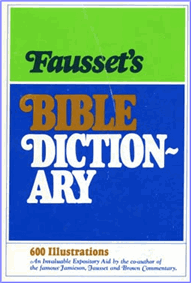Fausset's Bible Dictionary
A B C D E F G H I J K L M N O P Q R S T U V W X Y Z
Meshach
The Babylonian name given to Mishael, one of Daniel's three companions, of the blood royal of Judah (fulfilling the prophetic threat, Isaiah 39:7); with the first syllable of Mish-ael retained, but Sheik the Babylonian goddess (from whom Babylon is called Shesbach, Jeremiah 25:26) being substituted for El; the goddess of love and mirth, during whose feast Cyrus took Babylon, Venus or the Earth. "In whom was no blemish, well favored, skillful in all wisdom, cunning in knowledge, understanding science, having ability to stand in the king's palace," after Ashpenaz had put him in charge of the Melzar or "steward" to teach him "the learning and tongue of the Chaldaeans." (See MELZAR.) Appointed by the king a "daily provision of the king's meat (dainties) and wine three years, that at the end he might stand before the king" as an attendant courtier and counselor; not eunuch.
Like Daniel he refused the king's dainties with determined "purpose" (Daniel 1:8-16) because a portion of the viands and wine were first offered to idols on the hearth to consecrate the whole (Deuteronomy 32:38; 1 Corinthians 8:7; 1 Corinthians 8:10; 1 Corinthians 10:27-28). (See DANIEL.) The faith of these youths was made instrumental in overruling the foretold evil (Ezekiel 4:13; Hosea 9:3) to the glory of God; they "chose affliction with the people of God rather than the pleasures of sin for a season" (Hebrews 11:24-26). So far from losing by faithfulness, they "appeared in countenance fairer and fatter than all who did eat the king's meat," illustrating Deuteronomy 8:3; 1 Kings 3:11-13; Matthew 6:33.
"God gave them knowledge and skill in all learning and wisdom"; and "the king found them ten times better than all the magicians and astrologers in all his realm." Daniel, when promoted to be chief governor over all the wise men of Babylon and ruler over the whole province, remembered his three friends (contrast Genesis 40:23; Ecclesiastes 9:15-16; Amos 6:6); and at his request the king set them over the affairs of the province of Babylon (Daniel 2:48-49). Then followed the trial of their faith (1 Peter 1:7). They refused to bow to the king's image, which, like antichrist, he set up to be worshipped on pain of the fiery furnace (Revelation 13:14).
They reply, "we are not careful to answer thee in this matter" (Matthew 10:19; Matthew 10:28). Parleying, where duty is plain, is fatal; decision is safety. They answer his challenge, "who is that God that shall deliver you?" with "our God is able ... and He will deliver us," either from death or in death (2 Timothy 4:17-18). "But if not" literally, as He is able, still "we will not serve thy gods" (Job 13:15). The flame slew their persecutors (Psalm 7:16), but "not an hair of their head was singed" (Luke 12:7; Luke 21:18). The fire only burnt their bonds, so that they "walked loose in the midst of the fire" (John 8:36; Psalm 138:7; Isaiah 43:1-2); Jehovah was a wall of fire round them against their foes (Zechariah 2:5). So the king promoted them in the province, illustrating Proverbs 16:7; Proverbs 28:23; Psalm 119:46.
Bibliography Information
Fausset, Andrew Robert M.A., D.D., "Definition for 'meshach' Fausset's Bible Dictionary".
bible-history.com - Fausset's; 1878.
Copyright Information
© Fausset's Bible Dictionary
Fausset's Bible Dictionary Home
Bible History Online Home
Bible Encyclopedia (ISBE)
Online Bible (KJV)
Naves Topical Bible
Smith's Bible Dictionary
Easton's Bible Dictionary
Schaff's Bible Dictionary
Fausset's Bible Dictionary
Matthew Henry Bible Commentary
Hitchcock's Bible Dictionary

Dr. A.R. Fausset
Popular and Trending:
Meaning and definition of fasting, what is fasting in the bible, fasting definition, why should I fast, the power of prayer and fasting, Location of Galilee, where was galilee in the bible?, fasting definition, Galilee region, cities of Galilee, Sea of Galilee, Definition of biblical fire, what is fire in the bible?, fire and brimstone, fire meaning, baking bread with fire, Definition of the biblical firmament in Genesis, what is the firmament in the bible?, was the firmament the third heaven, firmament meaning, did the firmament bring the flood of Noah?.
